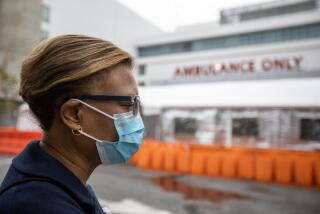Repeated Drug Errors Cited at King/Drew
Employees at Martin Luther King Jr./Drew Medical Center repeatedly withheld medications from patients and administered the wrong drugs or dosages, in some cases even as government health inspectors looked on, according to a federal report released Tuesday.
The inspectors, dispatched to the medical center after a meningitis patient was mistakenly given a potent anti-cancer drug for four days, found upon arrival this month that the man had been the victim of more than 40 subsequent errors.
Probing further, the reviewers found serious lapses in the pharmaceutical care of 11 other patients, sometimes witnessing mistakes or intervening to correct them, according to the report.
“It’s scary,” said Dr. Robert M. Wachter, chief of medical services at UC San Francisco, who reviewed the inspectors’ findings at the request of The Times. “This is a cautionary tale of what happens when everything falls apart.”
The report comes less than two months after a separate federal review found serious errors on the part of nurses and other staff members that contributed to five patient deaths at the Los Angeles County-owned hospital. Both inspections were prompted by specific cases but ultimately found systemic problems in areas where hospital officials insisted they had made reforms.
The U.S. Centers for Medicare and Medicaid Services has threatened to pull more than $200 million from King/Drew unless the hospital fixes shortcomings in its handling of drugs by March 23. That represents more than half the budget of the hospital in Willowbrook, south of Watts, which serves a largely minority population with few other options for care.
King/Drew officials submitted a plan of correction on Monday, and inspectors are likely to return in the next few days to determine if the hospital has followed through.
The inspectors’ findings point to a wide range of failings, sometimes noting day after day of lapses in a single patient’s care:
* A woman with respiratory failure and ovarian cancer received the wrong dosage of an antibiotic on Feb. 28; did not receive an ordered dose of a blood thinner on March 1; and was given only three of 12 ordered doses of respiratory drugs from Feb. 28 to March 2.
* A stroke patient had to wait nearly five hours for a drug to help prevent heart attacks and recurrent stroke. At one point, pharmacists wouldn’t fill the order because a doctor had spelled the drug’s name wrong. Later an inspector watched as two pharmacists within half an hour picked up the pill bag and looked at it but did not approve its use.
* In the case of a tuberculosis patient, an inspector found a missing dose of intravenous antibiotics on a pharmacy counter more than two hours after it had been ordered, with a sticker that read “missing dose.” The inspector noted errors in three of six medications given to the patient.
* A paraplegic with a pressure sore and bone infection was not given a laxative suppository that had been ordered and reordered by a physician over at least five days.
As a result, the patient required enemas on three of those days. Nurses and pharmacists also failed to carry out orders for other medications, including antibiotics, milk of magnesia, zinc oxide and vitamin C.
After the highly publicized mix-up involving the anti-cancer drug in February, King/Drew nurses and pharmacists failed to give the same patient, William Watson, 25 doses of medications ordered by doctors, gave him 12 extra doses that had not been ordered and one anti-psychotic injection that had not been prescribed.
Roger Rosen, a lawyer representing Watson, said the latest revelations were particularly disturbing in light of the attention focused on the first mistake.
The inspectors’ visit was prompted by a report in The Times. Hospital officials told the newspaper that the problems that led to the lapses had been fixed.
“Mistakes like this just can’t happen,” Rosen said. “Somebody’s got to address this and they’ve got to address it quickly, so people who go into this hospital have confidence and faith that this is not going to happen to them. It’s a sad thing.”
Inspectors found that mistakes had been happening for some time -- at least according to nurses.
“The orders are faxed to the pharmacy over and over again and the medications do not arrive,” the report said, summarizing nurses’ concerns. “If the medication is not delivered and nursing does not send someone to get it, ‘the medication is not given.’ ”
Pharmacy errors that harm and even kill patients are not unusual in U.S. hospitals. At least 7,000 deaths are believed to occur each year from prescription mistakes, according to a 1999 report by the National Institute of Medicine.
But the scope and frequency of King/Drew’s errors astonished experts consulted by The Times.
Wachter, who has written a book on medical errors, compared efforts to prevent mistakes to pieces of Swiss cheese.
When checks and balances are not in place, it’s as if holes in the cheese align and problems slip through.
“Here you have slices of Swiss cheese where there are more holes than cheese,” he said, referring to King/Drew.
Katherine Knapp, director of the Center for Pharmacy Practice Research and Development at Western University in Pomona, said it is important to flag new types of mistakes as they occur and create systems to prevent them.
“The good hospitals have systems that work through those problems and continually improve and refine things, based on what went wrong,” she said.
Knapp also questioned how things could go so wrong at a hospital that had been accredited by outside bodies.
“How could the hospital be accredited and have these systems operating so poorly?” she asked.
She said she was particularly distressed by the patient who did not receive his suppositories.
“I just think it’s so sad that that person didn’t receive better care. That’s a personal, not professional, observation.”
In the plan of correction prepared by King/Drew, hospital officials said they had hired runners to make sure doctors’ orders got to the pharmacy and drugs got back to patients promptly.
And they said they had added numerous additional checks by pharmacists, nurses and doctors to ensure that drug orders were accurate and that medications were administered as directed.
For instance, when medications are returned unused, pharmacists are now required to determine the reason -- to ensure that the dosage wasn’t skipped in error.
County health department officials, who in recent weeks have taken a direct hand in running the hospital, said they found it “shocking” that caregivers at King/Drew continued to perform poorly, even as inspectors looked on.
“They responded inappropriately and certainly didn’t behave as if they recognized the gravity of the situation,” said Fred Leaf, the health department’s chief operating officer.
Referring to pharmacists who dawdled in filling urgently needed orders, Leaf said, “That is intolerable, unacceptable and something that is, to me, unexplainable.”
Leaf said officials were reviewing “each and every error” identified by the inspectors to determine what action to take against the employees involved.
On a broader scale, the health department is firing five top leaders at the hospital in response to a series of sanctions from accrediting groups and regulators.
Amy Gutierrez, King/Drew’s pharmacy director, said the presence of the crisis team at the hospital had prompted action on long-standing problems.
“There is a culture within King/Drew Medical Center of new accountability toward patient safety,” she said. “We’ve put a lot of things in place in a short amount of time.”
Los Angeles County Supervisor Yvonne Brathwaite Burke, whose district includes the hospital, said she had to have faith in county health department leaders to turn the hospital around, because “I don’t have a lot of choice.”
In light of recent events, Burke said, “they will be doubly cautious.”
“But I would have thought that would be the case after the first incident,” she added, when the meningitis patient was given the cancer drug.
Times staff writers Mitchell Landsberg and Tracy Weber contributed to this report.
More to Read
Start your day right
Sign up for Essential California for news, features and recommendations from the L.A. Times and beyond in your inbox six days a week.
You may occasionally receive promotional content from the Los Angeles Times.






